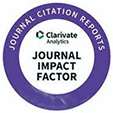THE EFFECT OF HEATING TIME TO THE CONTENT OF PIGMENTS AND VITAMIN A IN CASSAVA (Manihot esculenta Crantz) AND CEARA-RUBBER (Manihot glaziovii Muell. Arg) LEAVES
Madalena Madalena(1*), Heriyanto Heriyanto(2), Susanti Pudji Hastuti(3), Leenawaty Limantara(4)
(1) Faculty of Sciences and Mathematics, Satya Wacana Christian University Jl. Diponegoro 52 – 60, Salatiga 50711
(2) Workstation of Mochtar Riady Institute for Nanotechnology, Lippo Karawaci
(3) Faculty of Sciences and Mathematics, Satya Wacana Christian University Jl. Diponegoro 52 – 60, Salatiga 50711
(4) Faculty of Sciences and Mathematics, Satya Wacana Christian University Jl. Diponegoro 52 – 60, Salatiga 50711
(*) Corresponding Author
Abstract
Cassava and ceara-rubber leaves are leavy vegetables that can not be consumed in raw form because they contained cyanide, therefore cooking process is needed to remove the cyanide. However cooking process cause the changes of the content of pigments and vitamin A. The aims of the research are to know and to compare the effect of heating time to the content of pigments and vitamin A in cassava and ceara-rubber leaves. Content of chlorophyll and carotenoid was analized base of Porra and Lichtenthaler equations, respectively, while pheophytin content was analyzed base on HPLC. The result shown that the content of chlorophylls, carotenoids and vitamin A of cassava and ceara-rubber leaves were reduced, while the content of pheophytin was increased during heating. Pheophytin was the main product degradation of chlorophyll during heating of cassava and ceara-rubber leaves.
Keywords
Full Text:
Full Text PDFReferences
[1] Apriadji, W.H., 2001, www.sedap-sekejap.com/artikel/2001/edisi5/files/sehat.htm, 12 Desember 2003.
[2] Rubatzky, V.E., and Yamaguchi, M., 1995, Sayuran Dunia: Prinsip Produksi dan Gizi. Jilid 1, edisi kedua. Penerbit ITB Bandung, hal. 36-44, 57, 163-179.
[3] Anonim., 2002, www.glorianet.org/keluarga/ kesehatan/kesebuah.html., 12 Desember 2003.
[4] Sepridawati, 2002, www.geocities.com/bahana-tetap/iptek2014.htm. 01 Desember 2003.
[5] Gross, J., 1991, Pigments in Vegetables, Van Nostrand Reinhold, New York.
[6] Khomsan, A., 2002, http://www.intisari.com, 01 Desember 2003.
[7] Porra, R.J., Thompson, W.A., and Kriedemann, P.E., 1989, Biochim. Biophys. Acta., 975, 384-394.
[8] Lichtenthaler, H.K., 1987, Methods Enzymol., 148, 350-382.
[9] NAS-NRC, 1974, Recommended Dietary Allowances, 8 th ed. Food and Nutrition Board, Washington, D.C., 20-45.
[10] Madalena, Heriyanto, Hastuti, S.P., and Limantara, L., 2006, Pengaruh Lama Pemanasan Terhadap Komposisi Pigmen Daun Singkong (Manihot esculenta Crantz) dan Daun Singkong Karet (Manihot glaziovii Muell. Arg), Prosiding Seminar Nasional SPMIPA – Universitas Diponegoro.
[11] Dutton, H.J., Yu, Z.R., and Kohake, E., 1943, Ind. Eng. Chem., 35(11), 1173-1177.
[12] Sitompul, S.M., and Guritno, B., 1995, Analisis Pertumbuhan Tanaman, Gadjah Mada University Press., Yogyakarta.
[13] Faboya, O.O., 1984, J. Sci. Food Agric., 36, 740-744.
[14] Van Loey, A., Ooms, V., Weemaes, Van den Broeck, I., Ludikhuyze, L., Indrawati, Denys, S., and Hendrickx, M., 1998, J. Agric. Food Chem., 46(12), 5289-5294.
[15] Chen, H.E., Peng, H.Y., and Chen, B.H., 1996, Food Chemistry, 57(4), 497-503.
[16] Khachik, F., Goli, M.B., Beecher, G.R., Holden, J.M., Lusby, W.R., Tenorio, M.D., and Barera, M.R., 1992, J. Agric. Food Chem., 40, 390-398.
[17] Zechmeister, L., 1962, Cis-Trans Isomeric Carotenoids, Vitamin A and Anypolyenes, Academic Press, New York.
[18] Borchgrevink, N.C., and Charley, H., 1966, J. Am. Diet. Assoc., 49, 116-121.
[19] Schillinger, A., and Zimmermman, G., 1965, Deutsch, Lebensmittel. Rundsch., 61, 144-147 in Gross, J., 1991, Pigments in Vegetables, Van Nostrand Reinhold, New York.
[20] Simeonova, W., 1965, Von Pepsin, Nahrung, 9, 307-312 in Gross, J., 1991, Pigments in Vegetables, Van Nostrand Reinhold, New York.
[21] Hulshof, P.J.M., Chao, Xu, van der Bovenkamp, P., Muhilal, and West, C.E., 1997, J. Agric. Food Chem., 45, 1174-1179.
[22] Karjono, 1993. Pucuk Tanaman yang Jadi Sayuran. Trubus, No. 285, Agustus, 12-14.
[23] Penteado, M.V.C., and Almeida, L.B., 1988, Rev. Farm. Bioquim. Univ. Sao Paulo, 24, 39-49.
[24] Setiawati, P., 2003, Kandungan Vitamin A Beberapa Jenis Sayuran Berdaun, Skripsi: Fakultas Sains dan Matematika – Universitas Kristen Satya Wacana, Salatiga.
[25] Baloch, A.K., Buckle, K.A., and Edward, R.A., 1977, J. Food Technol., 12, 285-293.
[26] Almela, L., Fernandez-Lopez, J. A., and Roca M. J., 2000, J. Chromatogr. A., 870, 483-489.
[27] MacKinney, G., and Weast, C.A., 1940, Ind. Eng. Chem., 33, 392-395.
[28] Gold, H.J., and Weckel, H.G., 1959, Food Technol., 13, 281-286.
[29] Schwartz, S.J., and Lorenzo, T.V., 1991, J. Food. Sci., 56, 1059-1062.
[30] Charley, H., and Weaver, C., 1998, Foods, A Scientific Approach, New Jersey-Colombus, Ohio, 519-524.
[31] Haisman, R.D., and Clarke, W.M., 1975, J. Sci. Food. Agric., 26, 1111-1126.
[32] Watanabe, T., Nakazato, M., Mazaki, H., Hongu, A., Konno, M., Saitoh, S., and Honda, K., 1985, Biochim. Biophys. Acta., 807, 110-117.
[33] Campbell, H., 1937, Food Ress., 2, 55-57.
[34] Sari, T.M., 2003, Kandungan Klorofil, Klorofilid, Feofitin dan Feoforbid Daun Kemangi (Ocimum basilicum L. f. citatrum Back.), Skripsi: Fakultas Sains dan Matematika – Universitas Kristen Satya Wacana, Salatiga.
[35] Buckle, K.A., and Edward, R.A., 1970, J. Food Technol., 5, 173-186.
[36] Bacon, M.F., and Holden, M., 1967, Phytochemistry, 6, 193-210.
Article Metrics
Copyright (c) 2010 Indonesian Journal of Chemistry

This work is licensed under a Creative Commons Attribution-NonCommercial-NoDerivatives 4.0 International License.
Indonesian Journal of Chemistry (ISSN 1411-9420 /e-ISSN 2460-1578) - Chemistry Department, Universitas Gadjah Mada, Indonesia.











